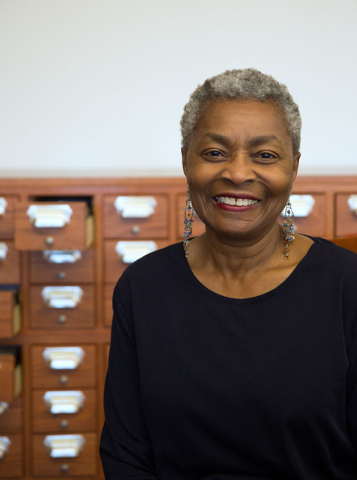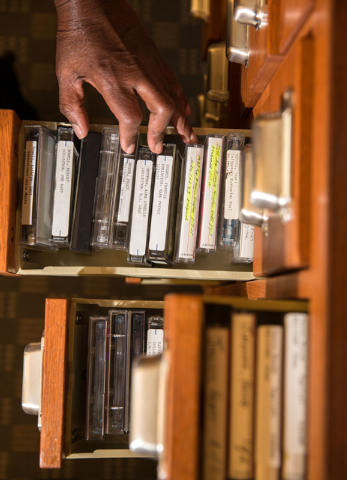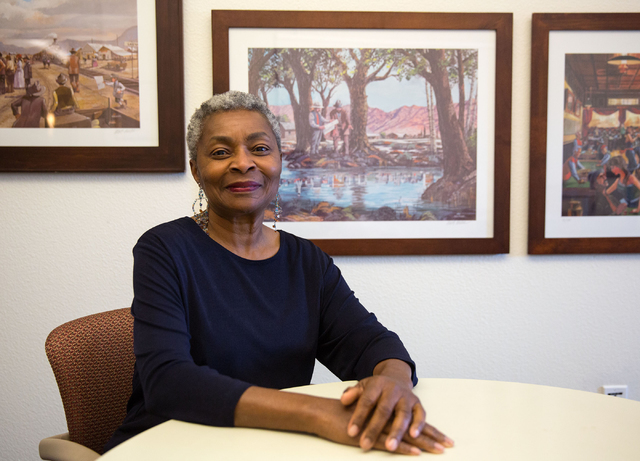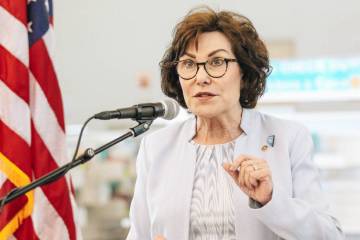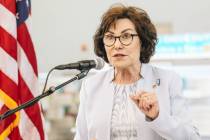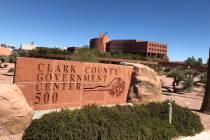Hooked on oral history
Sitting in a beauty shop in West Las Vegas, Claytee White was on a mission to find stories from the African-American community.
She was a graduate student in the mid-’90s in UNLV’s history department and was working on an oral history on women in gaming and entertainment. White was instructed to collect stories from black women.
“So I just put it out there and said, ‘I’m looking to interview black people who are a part of Las Vegas’ history,’ ” she says. “The lady in the chair said, ‘Oh, then you need to talk to my mother and father, Jimmy and Hazel Gay.’ ”
Within the week, White found herself with the Gays, hearing how they came to Las Vegas, and Jimmy’s struggles getting licensed as the first black mortician and his work at the Sands Hotel.
“(My first time interviewing) was frightening,” White says. “I didn’t ask good follow-up questions and it was hard to hear because I didn’t position the recorder right. But I was hooked. I was absolutely hooked.”
For more than a decade, White has been the director of UNLV’s oral history research center in charge of collecting and preserving the stories from Las Vegas residents who saw the city develop, grow and change.
“It has been an honor,” she says. “I get to learn about history through the eyes of people. I get to hear about historical events and family history and how they connect.”
White grew up in North Carolina in the ’50s and said she could never have imagined this is where she would end up.
Her entire schooling experience until later in college had been segregated.
“I remember not being able to sit at the stools at the drugstore and separate bathrooms,” she says.
But she also remembers being inspired by her black teachers.
“All the people I admired were teachers,” she says. “I was a sharecropper, and I wanted something different.
“There could have been (black women) who were doctors and lawyers, but I never saw any,” she says. “All I saw were black women as teachers. I saw how they dressed and how they spoke. I imagined they had a wonderful life and I wanted that.”
After she graduated from high school in 1966, she went to a historically black college.
“Even though I had a loan and a grant, my family still couldn’t afford it,” she says. “So I dropped out and moved to Washington, D.C.”
Two years later, she moved to Los Angeles. In 1972, she went back to college to finish her degree, majoring in sociology and social work.
“But I didn’t know what I wanted to do,” she says. “I was a late bloomer.”
In the meantime, she took a job working for a federally funded program in the inner city.
Four years later, she was looking for a change and started working as a bookkeeper. Her experience led her to open her own business doing taxes for people, typing and helping people prepare resumes.
While working, she joined the National Association for the Advancement of Colored People. She started as a volunteer.
“Then I was on the board of directors and was briefly hired as the executive director for the chapter,” she says.
In 1992, she remembers watching riots break out after a jury acquitted several police officers who beat an unarmed Rodney King. One day while sitting in a local shopping area, she was abruptly surrounded by rioters looting storefronts.
“And I realized I wasn’t happy in L.A. anymore,” she says.
White had been to Las Vegas many times and decided to try it as a place to live. She also decided to really think about what she wanted to do with her life.
“I knew I wanted to go back and get my master’s,” she says.
She called UNLV to get information about the history program, trying to figure out the differences between black history and black studies and women’s history and women’s studies.
“Those were what I was interested in,” she says.
Joanne Goodwin, a professor in UNLV’s history department and director of the Women’s Research Institute of Nevada, remembers getting White’s call.
“I was thrilled at the prospect of having a student (interested in African-American and women’s history),” she says. “At the time, we didn’t have the resources for African-American history. But she applied nonetheless.”
White enrolled in American history with a concentration on women’s history. During her studies, students had a chance to take a seminar on oral history — at the time UNR was the only institution collecting oral history for the state.
“We learned about how to do an oral history and the importance of oral history for communities,” she says. “Too quickly, people who had come here in the ’30s and ’40s were passing away.”
These people saw Las Vegas develop and had a stake in the telling of its history.
At the end of the seminar, Goodwin, White and a few others, decided to do an oral history project.
Through the Gay family, White was able to connect with other black entertainers and businesswomen.
“There were four of us (on the project) including myself,” Goodwin says. “But I think it’s fair to say it was Claytee who had the most extensive number of interviews.”
White not only completed the project, she also crafted her master’s thesis on African-American history.
“It is an excellent monograph on the history in Las Vegas,” Goodwin says. “She was able to provide the baseline information of African-American migration, community development and the (black) middle class’s involvement with the civil rights movement. She was also able to talk about the women involved in the process. The work is invaluable.”
After graduating with her master’s degree, White moved to Virginia to complete her doctorate at the College of William &Mary.
But she never finished it. She moved back to North Carolina instead.
“I had come full circle,” she says. “I wanted to spend time with my mother and make her last few years on this Earth as comfortable as possible.”
During her time, she developed a busy resume, which included running for political office.
Ultimately, she took a teaching position.
While White was on the East Coast, Goodwin heard discussions of getting funding for an oral history center at UNLV. As things came together, White’s name was passed around along with a few others as someone who could head an oral history department.
Not long after her mother died in 2002, White was called by UNLV, which had decided to create the department.
“I applied and I was lucky enough to get hired as the first director,” she says.
In more than a decade at UNLV, White has overseen projects and talked to myriad people to learn about the rise of Las Vegas through their eyes.
Her oral history projects include one about musicians who played for famous headliners, another about the history of health care professionals in Southern Nevada and one for the 50th anniversary of UNLV, which included interviews from some of its first faculty members and students.
White has even done projects that collect the history of certain neighborhoods. They are working on one for the West Charleston Boulevard area.
In 2014, White concluded a two-year project on the development of the African-American community in Las Vegas.
The African-American Experience in Las Vegas includes documents, photographs and a timeline of events that affected the black community — anything from prominent figures to important dates.
It also has dozens upon dozens of audio interviews collected from community members sharing their life stories.
White says the department is amid a similar project for the Jewish community.
While she continues to train people and collect Las Vegans’ stories, White gets to see the oral history department growing.
Goodwin says one of White’s gifts is the ability to inspire people in the history department.
“She has a talent — the ability — to excite people about her ideas,” she adds.
In the last few semesters, she has been asked to co-teach classes in which students learn how to collect oral histories.
“You don’t just go in with your recorder,” she says. “You have to know the history and go in a little prepared. You have to know what types of questions you’re going to ask.”
Contact reporter Michael Lyle at mlyle@reviewjournal.com or 702-387-5201. Follow @mjlyle on Twitter.



